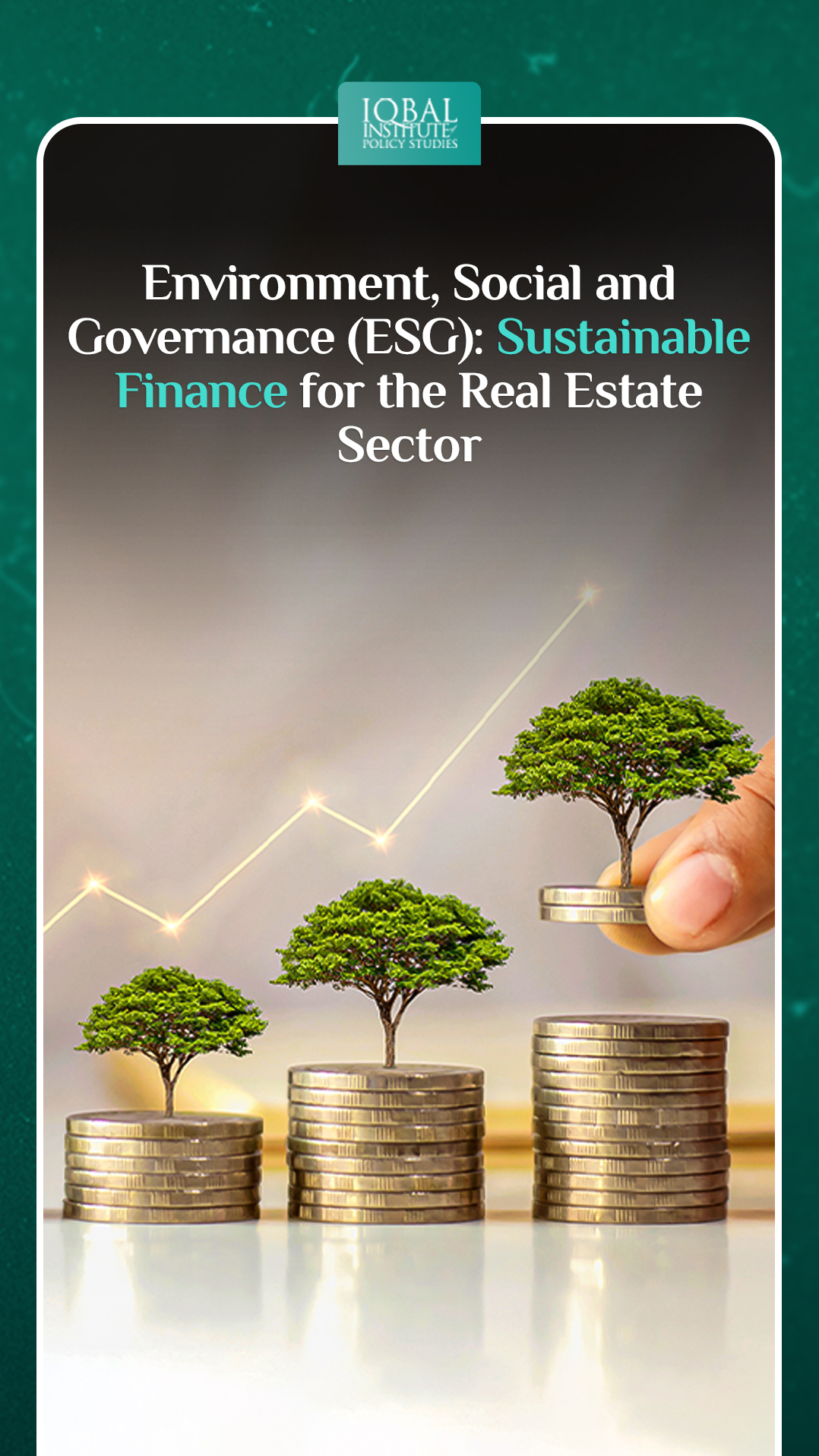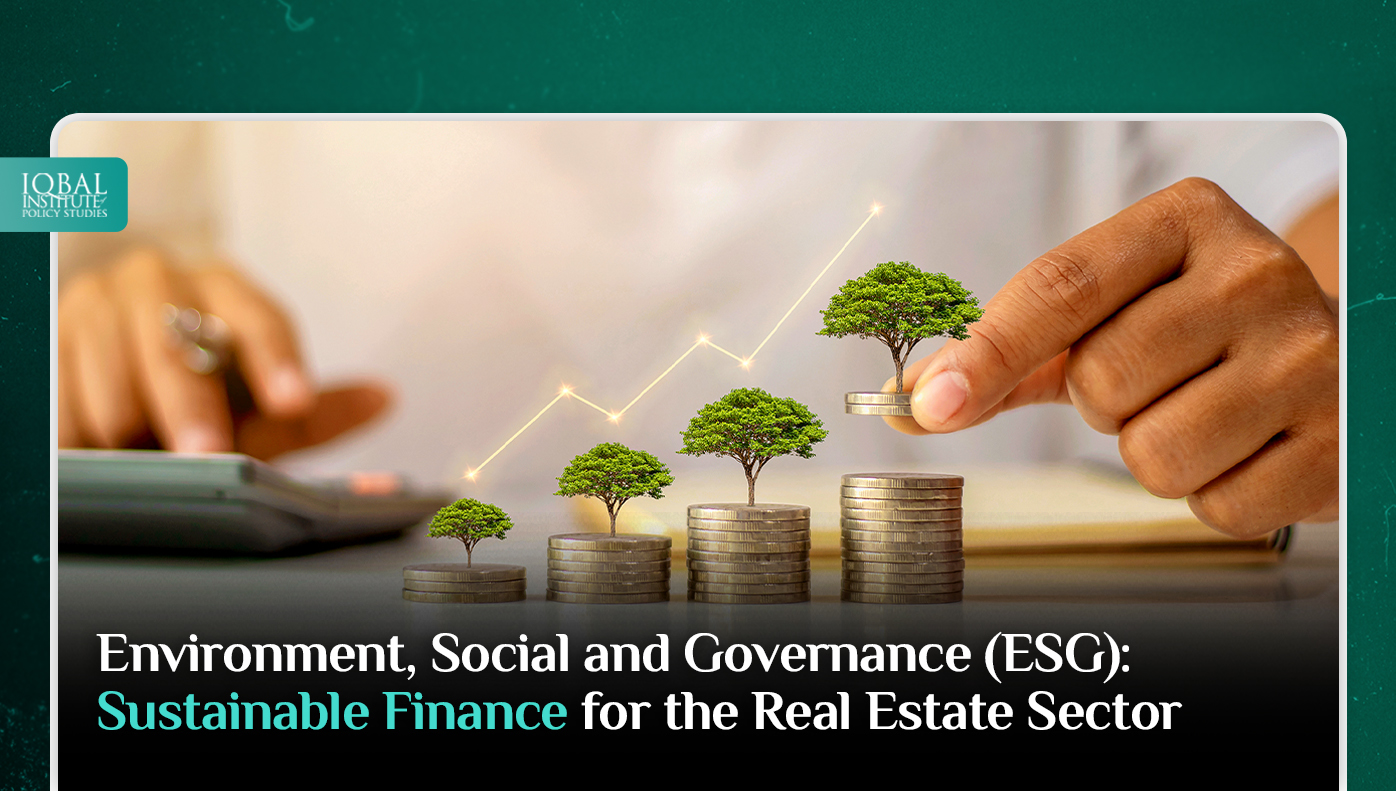Sustainable finance has become a trend because it incorporates ESG strategies when making investment decisions. It is gaining momentum as it has the power to bring awareness to the issues of sustainability and strive to achieve a sustainable agenda focused on inclusive growth and climate wealth. Since the real estate sector is one of the contributing factors towards radical climate change, real estate owners, stakeholders, and investors are recognising the significance of incorporating ESG in generating profit. Moreover, real estate businesses are adopting sustainability as it is becoming crucial for both investors and consumers that the companies in which they invest are socially responsible. ESG plays a huge role in driving sustainable finance, therefore the real estate sector is shifting towards a more sustainable approach. It will not only lessen the pace of climate change but also secure maximum finance leading to economic growth and social prosperity.
What is sustainable Finance?
Sustainable finance is a process of considering Environmental, social, and governance (ESG) when making investment decisions in the financial sector, driving more long-term investments in sustainable economic activities and projects. It encompasses a variety of activities from investing in green energy projects to putting cash into companies which focus on sustainable inclusive growth. Sustainable finance has a crucial role in the world’s transition to net zero by directing money into carbon-neutral projects.
How ESG Plan can Improve the Real Estate Sector’s Sustainable Finance Performance
Resilience During Risk Management
The real estate sector has a delirious impact on climate change. For example, buildings contribute to 38% of global greenhouse gas emissions. Moreover, a 2018 report estimated that globally, 35% of Real Estate Investment Trusts (REIT) properties are vulnerable to climate hazards of which 17% of properties are exposed to inland flood risk, 6% to sea level rise and coastal floods, and 12% to hurricanes or typhoons (King, 2018). Therefore, the real estate sector is focusing on building climate resilience into investment decisions as resilience has become a crucial factor in determining investment risk. According to a CFA institute survey, 65% of investors considered ESG issues to help manage investment risk and 45% of respondents took it because clients demand it (CFA Institute, 2017). Real estate portfolios with an ESG strategy and data management platforms stand out in the competitive market. Also, they provide the services of locating properties in safe areas, meeting the local environmental regulatory compliance standards, and informing investment decisions accordingly. These services can attract investors globally leading to increased productivity and growth in the real estate sector.
Transparency for Investors
Since sustainability has become mainstream, investors show a keen interest in companies which follow an effective ESG plan or show high ESG performance. Therefore, companies with growing ESG ratings have seen an increase in their share prices. For example, among the environment-resilient cities, Berlin has benefitted from foreign interest, seeing over USD5 billion of inbound capital in 2019 (World Economic Forum, 2020). Furthermore, investors take into account various ESG assessments of companies to allocate capital to real estate investment trusts or funds. As a result, companies have become more transparent and socially and environmentally responsible to gain maximum sustainable finance. For example, the Carbon Disclosure Project (an annual survey that allows companies to report on greenhouse gas emissions and ) climate change mitigation strategies have seen a 33% increase in participation since 2013, and the companies reporting to CDP now represent 56% of global market capitalisation (CDP, 2022). For example, an annual survey of the Carbon Disclosure Project that lists companies based on their sustainability has seen a 33% increase in participation and the companies which report to CDP represent 56% of global market capitalization.
A balance between Financial Performance and Sustainability
ESG strategies in the real estate sector can create a balance between financial performance and sustainability. For example, green-certified buildings have lower operating costs by up to 14% leading to an increase in net operating income. Furthermore, real estate companies that keep up with the investors’ demands and environmental performance can attract prospective clients who are actively seeking efficient, healthy and green-certified buildings to invest in. Hence, incorporating ESG in the real estate sector can lead to increased profitability through accelerating property values, tenant attraction and retention, and improved returns on investment. Global companies took in a record $859 billion in sustainable investments in 2021, including $481.8 billion in green bonds that raised money for specific environmental projects (World Economic Forum, 2022). Moreover, cities around the globe are showing environmental resilience to attract sustainable finance. For example, Milan’s vertical force, which consists of two residential blocks covered in 800 trees, 4500 shrubs, and 150,000 plants, aims to create a healthy urban space (World Economic Forum, 2017). Practices of adapting to ESG not only guarantee sustainability but also generate sustainable finance, thus creating a balance between the two.
Provide Better Returns and Investments
The total value of ESG investment is expected to exceed $53 trillion by 2025 (World Economic Forum, 2022). With rising inflation, and most risk assets performing poorly, investors are exceedingly turning to real estate companies governed by ESG to hedge the negative effects of rising prices on investment returns. In the past, investors had to compromise on return rates to save the planet. However, today sustainable businesses offer higher return rates. Sustainable real estate companies are more likely to procure sustainable finance attract lucrative investment opportunities, save costs by using minimum resources, have less regulation, retain prospective clients, and avoid losing money on carbon-intensive processes. For example, the sale prices were 8-18% higher in UK and Australia for sustainable buildings (Gobitschek, 2022).
Conclusion
The imminent threats of global warming have changed the way real estate businesses are operated. As finance plays a huge role in the growth and productivity of these businesses, real estate organisations are adapting ESG into their business plans to secure sustainable finance. Sustainable finance ensures the sustainability of the environment along with lucrative opportunities for prospective clients. This is crucial to building a resilient economy and sustainable recovery from the impacts of radical climate change.
References
CDP. (2022). Retrieved from https://www.cdp.net/en
CFA Institute. (2017). ENVIRONMENTAL, SOCIAL AND GOVERNANCE (ESG) SURVEY. CFA Institute. Retrieved from https://www.cfainstitute.org/-/media/documents/survey/esg-survey-report-2017.ashx
Gobitschek, M. (2022, July 20). SKAGEN. Retrieved from https://www.skagenfunds.ie/topic/real-estate/the-challenges-of-building-a-sustainable-real-estate-portfolio/
King, O. (2018, October 17). GEOPHY. Retrieved from https://geophy.com/insights/climate-risk-real-estate-and-the-bottom-line/
pricipal. (2019). Responsible property investing report. Retrieved from https://www.principalglobal.com/documentdownload/50786
UN environment programme. (2020, December 16). Retrieved from https://www.unep.org/news-and-stories/press-release/building-sector-emissions-hit-record-high-low-carbon-pandemic
World Economic Forum. (2017, October 26). Retrieved from https://www.weforum.org/agenda/2017/10/milan-s-tree-covered-skyscrapers-are-inspiring-the-world
World Economic Forum. (2020, January 19). Retrieved from https://www.weforum.org/agenda/2020/01/still-building-top-30-markets-for-real-estate
World Economic Forum. (2022, January 20). Retrieved from https://www.weforum.org/agenda/2022/01/what-is-sustainable-finance/#:~:text=Sustainable%20finance%20provides%20better%20returns,offer%20higher%20returns%20for%20investors.



Leave a Reply